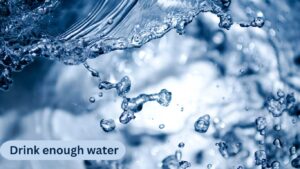HEAITH & BEAUTY
Body Hydration, Daily Hydration, Dehydration Awareness, Dehydration Signs, Digestive System, Health and Wellness, Hidden Dehydration Symptoms, Hydration Tips, Lack of Urination, Self-Care Tips, Signs of Dehydration, Stay Hydrated, Sugar Craving, Water Intake Benefits, Wellness Routine
admin
0 Comments
“10 Surprising Signs of Dehydration You’re Probably Overlooking”
Dehydration
Maintaining optimal health requires drinking enough water. Water plays a critical role in every system of the body, yet many of us might not even realize when we’re not getting enough. Dehydration can creep up on you without warning, leading to a variety of unexpected symptoms that you might overlook or misinterpret. Below, we outline 10 surprising signs of dehydration that may be slipping under your radar.
1. Persistent Fatigue:
Is Your Lack of Energy Linked to Dehydration?
If you find yourself constantly feeling tired, even after a good night’s sleep, dehydration might be to blame. Water is crucial for maintaining the body’s energy levels. When you are dehydrated, your blood volume decreases, causing your heart to work harder to supply oxygen and nutrients to your muscles and organs.
Pro Tip:
Instead of reaching for another cup of coffee, try drinking a glass of water. Often, a quick rehydration can bring back some of that lost energy.
2. Dry Skin:
Could Your Skin Be Screaming for Hydration?
While we often associate dry skin with cold weather or poor skincare routines, dehydration can be a silent culprit. Water is essential for skin elasticity and moisture retention. If your skin feels dry, flaky, or irritated, especially during the warmer months, it could be a sign that you’re not drinking enough water.
3. Headaches:
Could Dehydration Be the Cause of Your Head Pain?
Headaches are a common sign of dehydration and are often caused by the body’s fluid imbalance. When dehydrated, the brain can temporarily contract due to fluid loss, causing it to pull away from the skull and trigger pain receptors, leading to a headache. This type of headache often mimics the sensation of a tension headache or even a migraine.
If you frequently suffer from headaches, try keeping track of how much water you consume daily. Increasing your water intake can help reduce the frequency and intensity of dehydration-related headaches.

4. Dizziness:
A Dizzy Spell Could Be Your Body’s Cry for Water
Dehydration can cause a sudden drop in blood pressure, which may result in feelings of dizziness or lightheadedness. This is especially common after standing up quickly. If you experience this sensation frequently.
Be mindful of these signs, particularly in warmer environments or after exercise, where fluid loss is higher. Drinking water slowly over time helps restore your fluid balance and avoid these unpleasant symptoms.
5. Bad Breath:
Is Your Dry Mouth a Dehydration Indicator?
Saliva has natural antibacterial properties, and when you’re dehydrated, your body produces less saliva. This leads to dry mouth, which can cause an overgrowth of bacteria and, consequently, bad breath. If you notice an unusual taste in your mouth or persistent bad breath despite maintaining good oral hygiene, dehydration might be the root cause.
6. Muscle Cramps:
Are Your Muscles Craving Hydration?
Muscle cramps, especially during exercise, can be a sign of electrolyte imbalance due to dehydration. When your body sweats, it loses both water and essential minerals like potassium and sodium, which are necessary for proper muscle function. Without adequate fluids and electrolytes, your muscles may contract involuntarily, leading to painful cramps.

Replenishing lost electrolytes through sports drinks or eating potassium-rich foods like bananas can help prevent dehydration-related cramps.
7. Constipation:
Dehydration May Be Affecting Your Digestive System
Water is a key component in the digestion process, especially when it comes to moving food through your intestines. If you’re not drinking enough water, your stool can become dry and difficult to pass, leading to constipation. Many people overlook dehydration as a cause of digestive issues, but it’s often one of the first things that should be addressed when struggling with irregular bowel movements.
To avoid dehydration-related constipation, increase your water intake and consider adding more fiber-rich foods like fruits, vegetables, and whole grains into your diet.
8. Lack of Urination:
A Clear Sign You’re Not Drinking Enough Water
A healthy, hydrated body produces light-colored or clear urine regularly. If you find that you’re urinating less frequently or that your urine is dark yellow, this could be an indication that you’re not drinking enough fluids. Dark urine is a clear sign that your kidneys are working harder to retain water.

Monitor your urine color as a helpful indicator of your hydration status, and aim to consume more water if you notice it becoming more concentrated.
9. Sugar Cravings:
Are Dehydration and Hunger Linked?
Dehydration can trick your body into thinking it needs food, especially sugary snacks. When your body is dehydrated, it struggles to break down glycogen, which can lead to feelings of hunger or cravings for sugar. If you find yourself reaching for sweets more often than usual, your body may actually be asking for water rather than food.
10. Trouble Focusing:
Is Your Brain Dehydrated?
Water is critical for cognitive function, and even mild dehydration can impair concentration, memory, and alertness. If you’re struggling to focus at work or school, dehydration could be the underlying cause. This symptom is often dismissed as stress or fatigue, but it’s important to recognize how staying hydrated can boost your brainpower.
Try keeping a water bottle at your desk and sipping throughout the day to ensure your brain stays sharp and your focus stays intact.




Post Comment